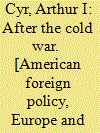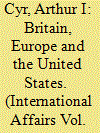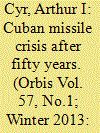|
|
|
Sort Order |
|
|
|
Items / Page
|
|
|
|
|
|
|
| Srl | Item |
| 1 |
ID:
049866


|
|
|
|
|
| Publication |
London, macmillan Press, 1997.
|
| Description |
xii, 204p.
|
| Standard Number |
0333672119
|
|
|
|
|
|
|
|
|
|
|
|
Copies: C:1/I:0,R:0,Q:0
Circulation
| Accession# | Call# | Current Location | Status | Policy | Location |
| 039703 | 327.73/CYR 039703 | Main | On Shelf | General | |
|
|
|
|
| 2 |
ID:
117356


|
|
|
|
|
| Publication |
2012.
|
| Summary/Abstract |
A useful analytic distinction between structural and policy differences was made by Henry Kissinger; the former must be accommodated while the latter may be resolved. There is no shortage of tensions and disagreements between the United States and the nations of Europe. Likewise, the bilateral alliance between Britain and the US has been defined in part by disagreements. Even during the Second World War, when the relationship was redefined in modern terms, there were strong conflicts despite the extraordinary incentives for cooperation.
From the start, a key strength of the Anglo-American alliance was emphasis on institutional structures for the long term, viewed as a complement to the essential immediate cooperation in fighting and ultimately defeating the Axis powers. The insight of Jean Monnet and others in employing economic tools for political and diplomatic ends has proven essential. The fortieth anniversary of Britain's entry into the European Community is a useful benchmark for retrospective analysis. For the US, the twin commitments of an active international role and unification of Europe around economic matters has been remarkably consistent. As John Mearsheimer has argued, the end of the Cold War removed fundamental incentives for cooperation. Nonetheless, institutional structures of both the EU and NATO have survived.
Britain traditionally has been reluctant to engage in continuous institutional engagement with Europe, beyond the requirements of military alliances helpful or essential to national security. The lengthy uneven character of the road to membership in Europe's economic institutions reflects this fundamental attitude. Currently, Britain's ambiguous role of participation in European institutions but not in the euro may in fact facilitate transatlantic cooperation, and illustrates the usefulness of Kissinger's point. The fading of militarism in Europe since 1945 is a fundamental accomplishment, often overlooked in contemporary economic debate.
|
|
|
|
|
|
|
|
|
|
|
|
|
|
|
|
| 3 |
ID:
118309


|
|
|
|
|
| Publication |
2013.
|
| Summary/Abstract |
The fiftieth anniversary of the October 1962 Cuban missile crisis is an appropriate time to review the events, which arguably were the closest the world has come to general nuclear war. The crisis was preceded by growing tensions between Moscow and Washington, and increasing Cuba emphasis in U.S. domestic politics. Analysts have differed on motives for trying to place long-range missiles in Cuba; Soviet officials consistently emphasized defense of Cuba. Revelations since the crisis indicate war was even closer than realized at the time. President John F. Kennedy deserves considerable credit for resisting military pressures.
The Cuban Missile Crisis of October 1962 arguably was the closest the world has come to nuclear war since the beginning of the nuclear era in 1945, and for that reason alone has been the focus of notable theatrical and literary products as well as scholarly analysis. The crisis has been described as President John F. Kennedy's "finest hour" in a touchingly brief tenure in the White House, and also as the direct result of weakness and miscalculation in the administration of that same American chief executive. Crisis management, a popular subject for analysis even before the crisis, received a major boost in visibility as a result of this unprecedented confrontation. The colorful personalities involved on both sides, including unpredictable Soviet Premier (Chairman of the Council of Ministers) Nikita Khrushchev, as well the photogenic and public relations-conscious U.S. leader, and some of their immediate advisers, have added to both human interest and dramatic potential. Finally, the crisis led to changes in strategic policies on the part of the United States and the Soviet Union, and their immediate allies. For these reasons and others, the half-century anniversary of the events merit a fresh look, both to review previous analyses and discuss lessons which bear on present-and future-international relations.1
The perceptions and conclusions among informed students of the Cuban Missile Crisis generally have shifted over the decades. At least in the United States, and among the international strategic studies community more generally, the initial reactions were generally laudatory of Kennedy and his men. Nuclear war had been avoided, while the goal of the removal of Soviet missiles from Cuba was achieved. Walt W. Rostow, a member of the Kennedy administration who later became national security adviser to President Lyndon B. Johnson, described the crisis as "the Gettysburg of the Cold War," a characteristic observation from this highly theoretical academic, but one which reflected wider sentiment. Later in the 1970s, as plots involving the U.S. government in efforts to assassinate Fidel Castro came to light, the Kennedy administration was regarded in a more critical light. During the same decade, information became public regarding JFK's reckless behavior in his personal life. That led at least some to analyze policies and politics of his administration with a much more critical perspective.2
|
|
|
|
|
|
|
|
|
|
|
|
|
|
|
|
| 4 |
ID:
188131


|
|
|
|
|
| Summary/Abstract |
The sixtieth anniversary of the Cuban missile crisis is an appropriate time to review the events—arguably the closest the world has come to nuclear war—from the perspective of 2022. Growing tensions between Moscow and Washington and increasing Cuba emphasis in US domestic politics preceded the confrontation. Analysts differ on motives for placing long-range missiles in Cuba; Soviet officials consistently emphasized the defense of the island. We know now that nuclear war was even closer than realized at the time. This article is a revision of one that appeared in the Winter 2013 issue.
|
|
|
|
|
|
|
|
|
|
|
|
|
|
|
|
| 5 |
ID:
122259


|
|
|
|
|
| Publication |
2013.
|
| Summary/Abstract |
The breaking-out of the Korean War - a conflict on the other side of the globe to the United States - came to have a significant impact not only on US domestic politics, but also on the country's worldview in the aftermath of the Second World War and its proactive engagement with the world thereafter. Arthur I Cyr explores the events as they unfolded and evaluates the effect of the conflict on the United States' relationships with its allies and the domestic wrangling that followed.
|
|
|
|
|
|
|
|
|
|
|
|
|
|
|
|
| 6 |
ID:
167830


|
|
|
|
|
| Summary/Abstract |
The article “Guns and Butter: Child Mortality and the Mediators of Militarization” addresses the important subject of the social and political roles of militaries in nations above a minimum population size. Each national population is evaluated in terms of 10 characteristics including survival rates of children, level of armed conflict, economic development, political representation, and others. The authors draw a sharp distinction between social militarization and praetorian militarization. The essay is valuable in providing one dimension of the impacts of militaries on nations. However, qualitative information and analysis would greatly benefit this work. In this regard, the work of Samuel P. Huntington is instructive.
|
|
|
|
|
|
|
|
|
|
|
|
|
|
|
|
| 7 |
ID:
143250


|
|
|
|
|
| Summary/Abstract |
Turkey's recent history has placed it at odds with Europe and the United States, leading some to suggest that Ankara has become an unreliable ally. Such a view is short-sighted. Turkey remains geostrategically important for a variety of reasons arising from both its pivotal location and its history. This article seeks to take the long view, placing recent developments in their historical context. Turkey's distinctive and long history is key to both analysis of the current situation, and evaluation of appropriate foreign policies toward Europe, the Middle East, the United States and the wider international system.
|
|
|
|
|
|
|
|
|
|
|
|
|
|
|
|
|
|
|
|
|